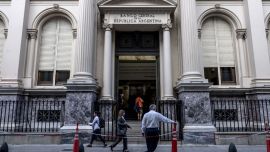Although still in choppy waters, the Mauricio Macri administration has managed to regain control of the difficult ship that is the Argentine economy.
After a strong surge in the value of the US dollar caused a run on emerging market currencies over the past month and a half, provoking a steep devaluation in Argentina that set off alarms across the board, an agreement with the International Monetary Fund (IMF) and reopened talks with the CGT labour confederation seems to have delivered some temporary respite.
At US$50 billion, the loan is substantially larger than originally expected, a bet by both the Argentine government and the multinational lender aimed at regaining market confidence. In response, the Merval stock index surged on Friday, managing to register four positive sessions out of the past five. Bonds rose modestly, analysts reported.
With the IMF deal sealed, President Macri flew yesterday to Canada to take part in the G7 summit. While there, he will meet with number of global leaders and IMF Managing Director Christine Lagarde.
It was late Thursday afternoon when the government confirmed it has agreed a deal with the IMF for a stand-by loan of US$50 billion over a three-year period.
From Washington, the IMF announced that the agreement would be subject to approval by its executive board, which will consider the Argentine government’s economic plan in the coming days.
Hours later, Central Bank Governor Federico Sturzenegger and Treasury Minister Nicolás Dujovne announced the details of the agreement at a press conference at the Kirchner Cultural Centre in central Buenos Aires.
“We have looked to the IMF to avoid a crisis,” Dujovne told journalists.
The 36-month loan contemplates an initial 30-percent transfer, or US$15 billion, on June 20, and a series of financial and macroeconomic measures.
“The [Argentine] authorities have indicated that they intend to draw on the first tranche of the arrangement but subsequently treat the loan as precautionary,” an IMF statement read.
‘SHUTTING IT OFF’
“For the past 70 years we’ve lived with inflation and with a Central Bank that transferred resources in order to finance those deficits, to the point where we’ve come to call that process the ‘little machine’ [‘la maquinita’],” Sturzenegger told reporters. “Today we are shutting it off.”
The IMF conditions for the Stand By Agreement (the technical name of the loan) include increased Central Bank independence and an acceleration in deficit reduction.
Starting with the latter, Dujovne explained the government now expects the fiscal deficit to drop from a current 2.7 percent of GDP to 1.3 percent next year and 0 percent in 2020, a year ahead of schedule. This will likely mean further belt-tightening, which risks pushing the economy into a recession.
“This agreement has a special social clause,” Dujovne noted, “it anticipates possible relaxing of our targets which would be destined to social security in case they become necessary.”
“The fiscal targets can be revised in case there is a need to increase social spending,” IMF Western Hemisphere Director Alejandro Werner confirmed yesterday. “That way, society does not have to choose between building a bridge or protecting the poorest.”
Meanwhile, the Central Bank will simultaneously aim at an inflation target of 20 to 21 percent by next June, dropping this year’s target of 15 percent, which has already been surpassed according to most private estimates. Under the revised plans, Sturzenegger will now be aiming for 17 percent by the end of next year, 13 percent by December 2020, and a much-coveted single-digit figure of nine percent by 2021.
The IMF also appears to have put its foot down on the controversial short-term instruments known as Lebacs, which it has asked the Central Bank to absorb over the next three years. Finally, the ruling Cambiemos (Let’s Change) coalition will try to pass a law giving the Central Bank further independence.
“This will be a great deal for all Argentines,” Macri said of the IMF loan, “it’s an important starting point [that will] generate more opportunities for growth [and] job-creation,” he told reporters at the Pink House.
Opposition lawmakers however were far from pleased. Peronists criticised the deal, with Presidential contender and Salta Province Governor Juan Manuel Urtubey calling it “a bad idea.”
Economist Martin Redrado, former head of the Central Bank, was wary of the IMF’s conditions, noting “if austerity is the only path, then it’s wrong.”
Going further, Kirchnerite lawmaker Agustín Rossi considered it to be “a relinquishing of our economic sovereignty [as] the IMF will be effectively conducting our economic policy.”
While the deal with the IMF has helped the government put a troubling currency crisis behind it, the rough spell has damaged Macri’s approval ratings. Higher than expected inflation — which private economists predict will be 27 percent by the end of the year — plus a weaker peso and lacklustre economic growth has led to an erosion of purchasing power.
In response, the government met with the leaders of the CGT and offered a five-percent increase in all collective wage negotiations that have already been approved, many of which had closed around 15 percent. The decree, signed by Macri, Cabinet Chief Marcos Peña, and Labour Minister Jorge Triaca, was part of the government’s strategy to deactivate a general strike initially scheduled for next week. Héctor Daer, member of the triumvirate leading the CGT, indicated they would come to a decision by Tuesday, where the Truck Drivers’ Union (Camioneros) — led by the Moyano family — will propose a general strike.
The currency crisis and its aftershocks appear to have led to a new phase for the government, forcing it to negotiate with other political parties as it acknowledges its plans have not achieved anticipated outcomes.
While last year’s victory in midterm elections seems to all but confirm re-election for Macri in 2019, the past month and a half has given the Peronist opposition hope that the next electoral battle may not be out of their hands.

























Comments